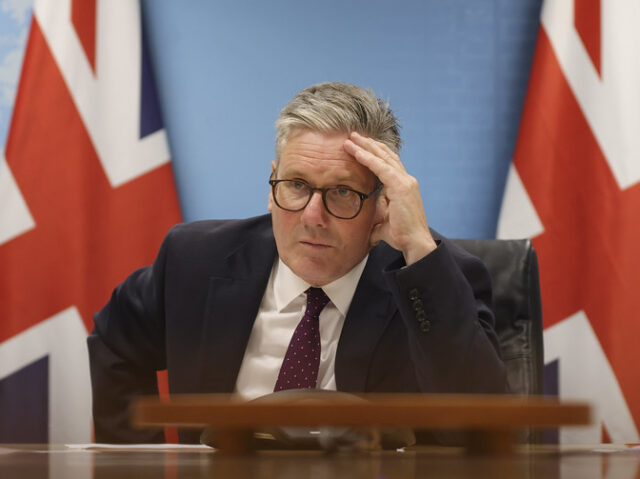The British government again impressed upon Israel that London wants a ceasefire in the Middle East, as Israel and the world remembers the October 7th terror attack massacre that took place one year ago today.
UK Prime Minister Sir Keir Starmer expressed his sympathy to the people of Israel in a statement on the first anniversary of the October 7th attacks, calling them “the darkest day in Jewish history since the Holocaust.” A year on, he said, the “collective grief has not diminished or waned.”
The left-wing leader also stated his determination to “bring those still captive home”, saying he had a “firm commitment”. He asserted: “we must unequivocally stand with the Jewish community.”
But the pathos of the sad remembrance had to make way for Starmer using the statement to repeat the foreign policy of the United Kingdom, that Israel should stop fighting back against its attackers and agree to a ceasefire. The British Prime Minister said:
We must also not look the other way as civilians bear the ongoing dire consequences of this conflict in the Middle East. I reiterate my call for immediate ceasefires in Gaza and Lebanon, and for the removal of all restrictions on humanitarian aid into Gaza.
In an ironic twist, the Prime Minister acknowledged that Britain’s multicultural society means “millions have family ties” to the Middle East and so is consequently prone to catching conflict-by-contagion, which he metaphorically compared to spreading like fire. He wrote in a newspaper op-ed on Sunday morning that prefigured his official statement by several hours that:
The flames from this deadly conflict now threaten to consume the region. And the sparks light touchpapers in our own communities here at home… They have a deep relationship with our multicultural society. Millions have family ties to the region.
Yet for Starmer, this multicultural society which he acknowledged is vulnerable to foreign conflict remains an absolute good that had to be backed up with the full force of the law. Careful to make any discussion of attacks on Jewish communities in the UK this past year a tandem discussion about attacks on Muslims or Mosques too, he asserted: “Any attack on a minority is an attack on our proud values of tolerance and respect. We will not stand for it.”
Starmer also used that article to call for his ceasefire and “two-state solution” pleas to be heeded. He claimed a “ceasefire in Gaza would also help de-escalate tension across the region”, and stated: “All parties now need to act with restraint and return to political, not military solutions. The path forward remains UN security council resolution 1701”.
While Starmer accepted “Iran’s support for terrorism and armed groups across the region has long menaced the Middle East”, nevertheless, he said he was against Israel doing anything direct about it, saying a “direct Iran-Israel conflict would have devastating consequences for the people of the Middle East and across the world.”
Calls for ceasefire do not generally go down well in Israel, which asserts that it is protecting its citizens from attacks, and the use of the October 7 anniversary to again call for a truce may be seen by some as tasteless. As reported in September such positions:
On Saturday’s “CNN This Morning,” IDF Spokesman Maj. Doron Spielman responded to frustration from the White House with Israel over ceasefires by stating that “for an entire year, Hezbollah has been firing rockets, over 9,000 rockets, missiles, and killer drones and no one talked about a ceasefire. Now that Israel’s actually taking the assertion to try to protect its civilians, we’re calling for a ceasefire.” And stated that “the world, instead of demanding [that Israel have] a ceasefire, should be demanding that Hezbollah pull out.”

COMMENTS
Please let us know if you're having issues with commenting.